Source: http://www.trafficmystic.com/228/how-to-write-your-first-copy-productively/
seo leaders online traffic mystic good backlink see book link building
Source: http://www.trafficmystic.com/228/how-to-write-your-first-copy-productively/
seo leaders online traffic mystic good backlink see book link building

It goes like this.
Our Mission is to provide the best SEO services in the world. We nurture win-win scenarios to create enduring value for our customers. We were voted top SEO agency in Texas and voted the best place to work. We value our staff - we want people to be the best we can be, so as we can maintain our preeminent position in the search industry
Place gun to my head. Pull trigger.
How many times have you come across corporate-speak and thought ?who are these people trying to kid?? Yet, when many business people sit down to write, that is the sort of thing they invariably come up with.
Why?
Because they are business people. They are talking about business. That is how business sounds.
Well, it?s how they think business should sound, because that?s the way it has always sounded - a monotone drone of description, chest puffed out. These people are stuck in the business-speak echo chamber.
No one sounds like business-speak in real life. If you ask someone how their job is going, a lot of them will invariably say ?it sucks?, "too busy", "it's okay". These same people might work for the firm that has says they were nominated ?best place to work?. The image and the reality don't match. At best, people will ignore business-speak. No one really believes it.
There are better ways to communicate.
A lot of business-speak fails to communicate because it isn't rooted in truth.
I once worked at a Telecommunications Company. The marketing team was having a meeting about a new brochure and came up with the slogan - I am not making this up - "(Company Name) - first in service!". Once I stopped wondering how any of these people ever managed to land a job in Marketing, I asked how we knew we were "first in service"? It seemed a reasonable question, but I may as well have asked the Pope if he really believed in God.
Apparently, it was self-evident we were first in service! There was no basis of truth in it, of course. Just an empty slogan, meaning nothing. No measurement. It was a phrase that "sounded positive!"
I doubt any customers believed it, especially those waiting in call queues.
Do you notice how some small companies try to appear large? They list multiple offices, when in, reality they consist of two guys who have a call forwarding service. I?m not quite sure why a company would pretend to be any bigger than it actually is, because as soon as they get a customer, they are going to get found out. The feeling they?ll likely leave with that customer is that they are fundamentally dishonest.
Which is a strange approach to take.
Many customers consider small to be an advantage. Small can mean you are more connected with your customers as there is no barrier between you and the customer. They can talk directly to you. They can email you. They can see you Twittering. Many customers love that. Big companies have ?policies?. They have call centers. They have barriers to entry. It?s no wonder they talk in business-speak. It?s just another means to keep people at a distance.
Small companies sometimes try to appear big because they think they need to be big in order to attract big companies as clients. This is sometimes true, but mostly false. It is true that big companies often like to deal with other big companies, mostly so they can successfully sue them if they stuff up. It is false because smart big companies will know a great idea when they hear one, and size simply won?t be a consideration so long as the small company has got something the big company wants.
For example, I mentioned I?d been reading ?The Pumpkin Plan? recently. There is a story about a tiny two person company. They came up with a new way of marketing pharmaceuticals.
One major problem many pharmaceutical companies face is that they need to change their marketing approach in different regions, even though they are marketing the exact same product.
In some areas, they have to market based on price (Los Angeles). In other markets they need to influence the cardiologists (Boston). In other areas they must talk directly to African-American patients (Atlanta). Exact same product, different marketing strategy for each city. Get the strategy wrong, and they waste a lot of money and lose market share.
Two guys came up with a way to crunch the numbers that tell pharmaceutical companies exactly what the biggest driver of performance is in each territory.
Through a network of colleagues, they managed to land a meeting with a pharmaceutical company. Not just any meeting - they go straight to the top floor, and talk to the Chairman Johnson & Johnson Pharmaceuticals. They barely get five slides into their presentation when the Chairman stops them to call in his VP of marketing. They both love the idea! This solves a big problem for Johnson and Johnson. The result is that this two person company lands 500K worth of business on the spot, $4m worth of business in the first two years, and $14.2m by year four. They expand, of course.
So, they were two guys pitching to one the biggest pharmaceutical businesses in the world. They landed millions of dollars worth of business because Johnson and Johnson like their idea. They didn?t need to convince Johnson and Johnson they were anything more than two guys with a good idea. It didn't require any business-speak about mission statements, just a focus on finding and solving a real problem.
If you?re ever tempted to write business-speak, try telling a story instead. Turn your pitches into stories. Turn your proposal into stories. Turn your presentations into stories. Make them true stories. Tell them in your authentic voice. People love to be told a story as stories are both familiar and revealing. A string of facts is never going to have the same impact. Business-speak will invariably leave an audience focused on their smartphones.
A story can be about how you solved a problem in the past. A problem just like the one your prospective clients are having. What was the problem? Why was it painful? What did you do to solve it? What was the result?
Easy and memorable. You can structure almost anything as a story. Stories move from the status quo, straight into a crisis (business problem), then the crisis is resolved, and a new status quo is reached. Start with a problem. Explain why it is painful. Bring in the hero - you - and tell them what you did to solve the problem. Then tell them the result - the new status quo.

Are you more likely to recall the text of my opening paragraph, or the story about the two guys pitching to Johnson and Johnson?
Stories can be so much more effective than business-speak.
Source: http://www.seobook.com/why-do-businesses-talk-way
seo tool land seo leaders online traffic mystic good backlink see book
Source: http://www.bad-neighborhood.com
seo tool land seo leaders online traffic mystic good backlink see book
Source: http://www.rustybrick.com/pagerank-prediction.php
seo tool land seo leaders online traffic mystic good backlink see book
Source: http://www.trafficmystic.com/228/how-to-write-your-first-copy-productively/
Source: http://www.top25web.com/pagerank.php
seo tool land seo leaders online traffic mystic good backlink see book
Source: http://www.prsearch.biz/
seo tool land seo leaders online traffic mystic good backlink see book

Getting traffic to a site is one thing. How do we best engage visitors once they arrive?
Since Update Penquin/Panda, engagement metrics have become more important. In order for our sites to rank well, we need to avoid the bounce - the immediate click-back - or we?re likely to experience drops in ranking. We need to pull visitors deeper into our site. We need more genuine engagement.
Even if engagement metrics had no impact on rankings, optimizing for engagement is always going to be beneficial. The more engaged our audience, the more influence we?re likely to have, and we derive the benefits that flow from it.
Here are a few ideas on visitor engagement, and how to optimize for it.
When visitors have so many options, it?s difficult to engage them for long. We can?t accommodate every need on one site. It?s certainly impossible to accommodate every need within one or two clicks. So, to make the most of every opportunity, we should be optimizing engagement factors.
One problem with content-based approaches is that they tend to be top-down. The visitor is assumed to be a somewhat passive recipient of published information. However, at the heart of engagement is a two-way conversation. In order to foster engagement, we must encourage participation, as opposed to simply deliver content.
The web is moving from an information age to a relationship age. Social media demonstrates that information is intersecting in new ways. Information is being sliced, diced, repurposed, remixed and redelivered, turning ?recipients? into producers. The act of consumption changes the information, and often creates new information. Conversation, as discussed in the Cluetrain Manifesto, is crucial in this new economy.
?Historically, the authors state, the marketplace was a location where people gathered and talked to each other: they would discuss available products, price, reputation and in doing so connect with others (theses 2?5.) The authors then assert that the internet is providing a means for anyone connected to the internet to re-enter such a virtual marketplace and once again achieve such a level of communication between people. This, prior to the internet, had not been available in the age of mass media (thesis 6.)?
And that conversation will largely be decided by our visitors. It certainly reshapes marketing. To give an offline example, what?s the problem with marketing television and radio? We watch or listen to the content, but the marketing keeps jumping in, which is intrusive and disruptive.
Engagement Marketing is the opposite. The marketer hangs back and engages with the visitor of and when they need it. Look for ways the visitor can initiate and direct the engagement.
How do we best measure engagement?
We start with a benchmark, which is the current level of engagement. We could look at the engagement link in Google Analytics. Typical measurements include time on site, pages per visit, inbound links, mentions on twitter, return visits, new users per date range, categories of interest, and page depth.
All good. If those metrics increase, it certainly feels like we?re being more engaging. One example might be to examine visitor flow through the site. If we can identify bottlenecks - the point where engagement breaks down - then we can adjust our approach at this point to clear the bottleneck.
But we need to be sure this engagement benefits us. Are these metrics aligned with our business goals? People might well be spending a lot of time on our site, but that might be because they?re lost. We might be getting a lot of mentions on Facebook and Twitter, but are these people actually buying anything? Mentions on Twitter & Facebook might be great metrics for a brand strategy, but not so great for conversion strategy, at least, not in the short term, and not in isolation.
Engagement must translate, and be aligned with, business goals. When choosing what engagement metrics to measure, ask yourself how this type of engagement helps achieve your goals. Also, are there other types of engagement we could foster to support own goals?
This video is a little sales pitch-y, but contains some interesting lessons on optimizing engagement.
Optimizer, Dan Siroker, who once worked for Google before moving onto the Obama campaign talks about how they used metrics to increase engagement. Both Obama campaigns have demonstrated effective use of digital engagement and measurement to help produce a desired election result. The techniques involve establishing a baseline i.e. seeing what they do already and increasing performance by making tweaks and adjustments, and measuring the result.
He found that, generally speaking, these rules apply when optimizing for engagament:
Start By Defining Success: How will you know if your engagement optimization has worked? Decide on a few, quantifiable measures based around a visitor taking a desirable action. Link those actions to business return.
Less Is More - if we reduce choice, people are more likely to engage. In this example, they reduced the fields people needed to fill in to only those actually required, rather than all the information that may be desirable. Look for ways you can streamline and thus boost engagement.
Words Matter - focus on your call to action. Calls to action tend to work best when you tell the visitor exactly what they have to do. Be explicit. In this example, they compared the phrase ?Free trial? vs ?Try It Free?. The latter resulted in 14.6% improvement. This was most likely because it was an explicit call to action. However, the ?why? doesn?t really matter. The point is to measure one thing against another and see what actually works.
Fail Fast And fail cheap!. It?s all about being iterative. Being flexible. Trying things out. The underlying presumption is that a lot of things we do aren?t going to work, no matter how logical and rational they seem to be when we devise them.
So, rather than be afraid to make a change, as this may result in failure, grasp the opportunity to make a change and be sure to ?fail fast?. If something is not working out, cut it quickly, and try something else, until it does work. If it hurts, dump it quick and move on.
Start Today It?s easy to talk about being engaging, but what really matters is taking action to be more engaging. If there?s one thing you can do today to make your site more engaging, what would it be? Go do that. Test it. And then do something else tomorrow :)
In the video, Dan talks mostly about process changes. Another area is, of course, web design.
This article talks about the influence of design on engagement, based on opinion on what design is preferable to another.
If we go back to the rules of engagement, the important thing to do is to test. Test one design against each other to see which is more engaging based on desired visitor action. Ensure the engagement measurement is aligned with a business goal i.e. ?we want more 50% orders via our web site?.
Do Blogs, Twitter and Facebook help you meet your engagement goals?
Is anyone reading our posts? If they do, what do they do next? Anything? Many people are very busy in this space, but generate little or no return on investment. When it comes to engagement, it?s one thing to measure activity, quite another to measure if that activity actually means something.
Part of the problem is not focusing on ROI. Determine your business goals, then shape your social media approach to bring about these goals. One example might be ?Twitter traffic makes a donation to our cause?. We?d measure the Twitter traffic, and link it to a successful donation.
This is a good example of where metrics can be deceptive. If we measured Twitter traffic, and time on site, and depth of their activity on-site, that might look great in terms of engagement, but if it doesn?t serve a business purpose, then why are we doing it? If people spend more time on site, is that good? Well, not if we want them to sign up, but they didn?t
There is no substitute for relevance. Relevance is the first, essential step. The next step is pull the visitor in, get them contributing, and get them coming back.
Alan Moore, Director of the Comparative Media Studies Program at MIT, puts it well:
Engagement marketing is ?premised upon: transparency - interactivity - immediacy - facilitation - engagement - co-creation - collaboration - experience and trust, these words define the migration from mass media to social media. The explosion of: Myspace, YouTube, Second Life and other MMORPG's, Citizen Journalism, Wicki's and Swicki's, TV formats like Pop Idol, or Jamies School Dinners, Blogs, social search, The Guinness Visitor Centre in Dublin or the Eden project in Cornwall UK, mobile games like Superstable or Twins, or, new business platforms like Spreadshirt.com all demonstrate a new socio-economic model, where engagement sits at the epicentre
In order for the following media examples and strategies to work well, they should have as many of these qualities - transparency - interactivity - immediacy - facilitation - engagement - co-creation - collaboration - experience and trust - as possible. No doubt you've experienced the frustration of heavily moderated and delayed visitor comments on mainstream media acticles. They rob the interaction of immediacy and trust, so it?s no wonder their business model is dying in the face of relatively open and immediate citizen media and reporting.
A quality content strategy is likely to keep people reading, bookmarking, and coming back. Quality is, of course, relative. Compare your content with that of your opponents. Obviously, your stuff needs to be better. Even if people do click away, they may well return if they look at your competitors and find their quality lacking.
Video and audio are linear, so people, once engaged, are likely to engage as long as the media lasts. Likewise, webcasts engage people in the same way, with the added bonus that visitors can interact, if they wish. If increasing time on site aligns with your business goals, then video and audio might be good media to try.
People love giving their opinion. Look for ways to allow them to do so. Blog comments, obviously. Forums. Encouraging people to Tweet or post to their favored social media channel. Implement chat applications, where appropriate, to seek direct feedback. Amazon?s value is considerably increased by their review system - by giving their customers a voice, whether their opinion is positive or negative.
Use mailing lists. These are especially useful for up sells and cross sells post-purchase. Up-sells are when you encourage the customer to buy something more expensive. Cross-selling is when we sell the existing customer an additional item. I receive special discounts from a clothing retailer I buy from on a regular basis, based on my previous buying history. This retains engagement after I've left the site, and because it's relevant and beneficial, it doesn't feel intrusive. It?s considerably more expensive to get a new customer, rather than look after those customers you?ve got, so look for ways to pass on that value to existing customers. They are likely to be highly receptive and willing to engage, as you?ve already convinced them once.
Brand. A huge topic, but let?s take a look at brand in terms of engagement. A brand is an experience. We associate feelings and thoughts with a brand. Apple?s brand is as much about technology as it is about fashion, desirability and identity. Apple creates engagement on a number of levels, but perhaps the most effective is that you become a ?member of a club? when you buy an Apple product. The sense of belonging, and defending and asserting your purchase in the cleverly constructed ?Apple vs everything else? debate creates a deep level of engagement.
Try to foster a sense of community. It runs very deep in the human psyche. We used to get a sense of community by geographic location. but now our sense of community is largely defined by the tribes to which we belong.
Source: http://www.top25web.com/pagerank.php
seo tools seo tool land seo leaders online traffic mystic good backlink

Ford said ?give the customer any color they want, so long as it is black?. This strategy worked for a while, because people just wanted a car. However, the market changed when GM decided they would offer a range of cars to suit different ?purposes, purses and personalities?.
Between 1920 and 1923, Ford?s market share plummeted from 55 to 12 percent.
These days, auto manufacturers segment the market, rather than treat it as one homogeneous mass. There are cars for the rich, cars for the less well off, cars built for speed, and cars built for shopping.
Manufacturers do this because few manufacturers can cater to very large markets where the consumer has infinite choice. To be all things to all people is impossible, but to be the best for a smaller, well-defined group of people is a viable business strategy. It costs less to target, and therefore has less risk of failure. Search marketing is all about targeting, so let's take a look at various ways to think about targeting in terms of the underlying marketing theory which might give you a few ideas on how to refine and optimize your approach.
While there are many ways to break down a market, here are three main concepts.
Any market can be broken down into segments. A segment means ?a group of people?. We can group people by various means, however the most common forms of segmentation include:
Benefit segmentation: a group of people who seek similar benefits. For example, people who want bright white teeth would seek a toothpaste that includes whitener. People who are more concerned with tooth decay may choose a toothpaste that promises healthy teeth.
Demographic Segmentation: a group of people who share a similar age, gender, income, occupation, education, religion, race and nationality. For example, retired people may be more interested in investment services than a student would, as retired people are more likely to have capital to invest.
Occasion Segmentation: a group of people who buy things at a particular time. Valentines Day is one of the most popular days for restaurant bookings. People may buy orange juice when they think about breakfast time, but not necessarily at dinner. The reverse is true for wine.
Usage Segmentation: a group of people who buy certain volumes, or at specific frequencies. For example, a group of people might dine out regularly, vs those who only do so occasionally. The message to each group would be different. 
Lifestyle segmentation: a group of people who may share the same hobbies, or live a certain way. For example, a group of people who collect art, or a group of people who are socialites.
The aim is to find a well-defined market opportunity that is still large enough to be financially viable. If one segment is not big enough, a business may combine segments - say, young people (demographic) who want whiter teeth (benefit). The marketing for this combined segment would be different - and significantly more focused - that the more general ?those who want whiter teeth? (benefit) market segment, alone.
How does this apply to search and internet marketing in general?
It?s all about knowing your customer. ?Knowing the customer? is an easy thing to say, and something of a cliche, but these marketing concepts can help provide us with a structured framework within which to test our assumptions.
Perhaps that landing page I?ve been working on isn?t really working out. Could it be because I haven?t segmented enough? Have I gone too broad in my appeal? Am I talking the language of benefits when I should really be focusing on usage factors? What happens if I combine ?demographics? with ?occassion??
Niches are similar to segments, but even more tightly defined based on unique needs. For example, ?search engine marketing education? is a niche that doesn?t really fit usefully within segments such as demographics, lifestyle or occasion.
The advantage of niche targeting is that you may have few competitors and you may be able to charge high margins, as there is a consumer need, but very few people offer what you do. The downside is that the niche could weaken, move, or disappear. To mitigate this risk, businesses will often target a number of niches - the equivalent of running multiple web sites - reasoning that if one niche moves or disappears, then the other niches will take up the slack.
Search marketing has opened up many niches that didn?t previously exist due to improved marketing efficiency. It doesn?t cost much to talk to people anywhere in the world. Previously, niches that required a global audience in order to be viable were prohibitive due to the cost of reaching people spread over such a wide geographic area.
To function well in a niche, smaller companies typically need to be highly customer focused and service oriented as small niche businesses typically can?t drive price down by ramping volume.
Cells are micro-opportunities. This type of marketing is often overlooked, but will become a lot more commonplace on the web due to the easy access to data.
For example, if you collect data about your customers buying habits, you might be able to identify patterns within that data that create further marketing opportunities.
If you discover that twenty people bought both an iPhone and a PC, then they may be in the market for software products that makes it easy for the two devices to talk to each other. Instead of targeting the broader iPhone purchaser market, you might tailor the message specifically for the iphone plus PC people, reasoning that they may be having trouble getting the two devices to perform certain functions, and would welcome a simple solution.
Source: http://www.seobook.com/three-ways-break-down-market
seo leaders online traffic mystic good backlink see book link building
Source: http://gsitecrawler.com/tools/server-status.aspx
use seo seo tools seo tool land seo leaders online traffic mystic
Source: http://uptimebot.com/sql/one.php
seo tools seo tool land seo leaders online traffic mystic good backlink

Here are some quick tips on how you can use blogrolls to compose a list of as many related blogs as possible, then checking those blogs to see if any of them return 404s.
A good free tool to use for finding blogs is the SoloSEO link tool, which will pull up blogs (and other assorted advanced search operators) based on the keyword you input.
After going through the ways to build the list, I?ll run through a few ways you can use it.
Start off by finding a few related blogs that have blogrolls. The more blogs & the longer the blogrolls of each, the better. This is our seed list that will soon multiply itself.
Take the URLs of these blogs and throw them into Buzzstream?s blogroll list builder. In the example below, I just started off with one (an HR blog):
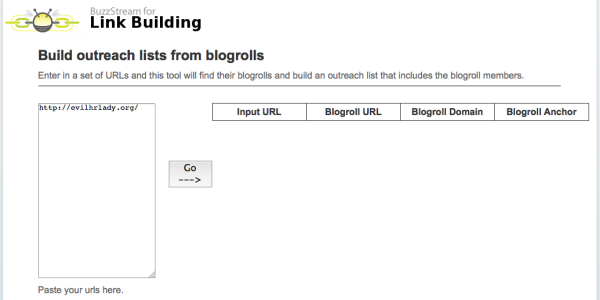
Once you hit Go, it searches the blog(s) and finds every blog in their blogroll (note: I was having issues with it in Chrome, so if you do as well, switch browsers):
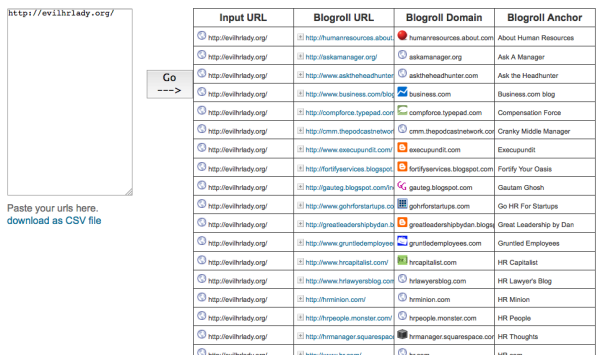
Next, download the results as CSV. Open it up in Excel, then copy & paste the blogroll URLs back into the list builder tool (you might have to refresh/reopen the page).
Keep doing this until you have a sizeable list. The bigger the better, but as you keep expanding, you?ll run into the issue of irrelevant blogs entering the list, so just keep that in mind.
Next, throw your list of URLs into Citation Lab?s URL Status Checker tool. This will check to see if any of the URLs in the blogroll are 404s.
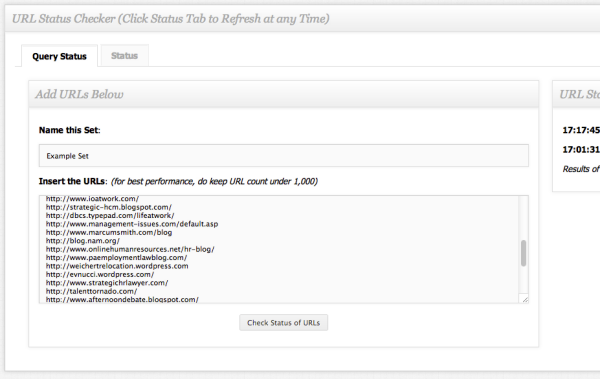
Once the report is finished, you can export it as a CSV.
Now it?s up to you how you want to use this list for broken link building. Here are a few popular options:
1. Blogroll Links
Go down the list of 404s and plug them into any of the bigger link tools on the market, Open Site Explorer, Ahrefs.Com, or MajesticSEO. Scan their top links for any that are coming from a homepage. These are almost always blogroll links.
Go to these homepages and use the Check My Links chrome extension, because if one link in their blogroll is broken, then there?s usually a few others.
From there, reach out to the bloggers letting them know of the broken links. Then ask them if one of them could be replaced with a link to your blog since it?s related.
2. Dead Content Links
Once again, plug the 404s into the link tool of your choice. This time however, instead of checking their links, click on Top Pages section in the tool.
Find their most linked to content, double check each to make sure the page is no longer available, then plug those URLs into Archive.org to see what content used to be there.
Next you?re going to rewrite the content, but do your best to make it even better. If it?s a little outdated, then update it.
This content will not only attract links on its own with proper promotion (the old one did, the new one probably will as well), but you can now use this for broken link building.
Take the URLs of the broken, linked-to content and plug it into your link tool(s). Go down the list and find the most valuable links to that content, then reach out to the webmaster/blogger of those sites and let them know that page is broken.
Tell them that ?you took the burden? of recreating it, and that for the sake of their readers, they should update the broken link by now linking to you.
You can also use the initial list of 404s to see if any of those domains are:
If they have enough links to them, you can put some content up and include a few links back to you. If you?re going to do this, make sure you put content up on their Top Pages, since these are already loaded with link juice.
Finally, you can take that list of blogrolls, remove all the 404s & duplicates, and use the Mozscape API (with excel) to find the most authoritative blogs in your niche. From there, build relationships, ask for product reviews, or anything else you can think of.
So many of the tools we have ready at our fingers can be used in various combinations. Don?t be afraid to experiment.
What do you think of this process? What do you think can be improved? I?d love to hear your thoughts below!
Jon Cooper is an SEO consultant and the author of Point Blank SEO, a link building blog. Follow him on Twitter @pointblankseo.
Source: http://www.seobook.com/broken-link-building-tips-jon-cooper
seo tools seo tool land seo leaders online traffic mystic good backlink
Source: http://www.wordstream.com/keyword-niche-finder/
seo leaders online traffic mystic good backlink see book link building

In that past, we?ve talked a lot about Google?s brand bias, but no matter how a brand is defined in technical terms, the reality is that Google cannot leave popular brand sites out of the search results.
If a person searches for, say, AVIS, and doesn?t see AVIS in the top spot, then as far as the searcher is concerned, Google is broken. If a person searches for various car rental terms and does not see AVIS somewhere, then it's also likely they'll expect Google is broken.
Google isn?t perceived as broken, however, if car-rental-cars-online.com is nowhere to be seen. Some might argue Google is doing the searcher a favour by ignoring such a site.
There was a time on the web when relevant information was harder to come by. Not so now. Now, we have too much information. We don?t even know how big the internet is. They're guessing two trillion pages. And counting.
So, the real competition is clutter.
The real opportunity is to find clear space amongst the throng.
One way to do that is by developing a clear brand identity.
A logo? A set of graphics? A catchy name?
Not really.
Plenty of companies have logos, graphics and a catchy name but they do not have strong brand identities. A brand is largely about how other people define you. They define you based on the experience they have when engaging with you.
For example, take Apple. How would you define their brand? The logo? The shops? The fonts they use in their advertising?
These aspects are not Apple?s brand. Apple?s brand is in the way Apple?s customers feel about Apple. It?s a feeling tied up with concepts such fashion, design, innovation and quality - and unique to Apple.
This feeling creates a clear identity in the mind of the customer.
Having a clear identity makes you memorable. People will remember your site name. People will search for your site name. And when enough people do that, then there is little chance Google can ever drop you below number #1 for brand searches. If you get it right, Google will even rank you against relevant related keywords you aren't targeting.
Because Google would look broken if it didn't feature you.
Tooting our own horn here, but if you typed ?seo book? into Google, and didn?t see this site, you?d think Google was broken. There are plenty of books on SEO, but only one ?seo book? that owns a clear brand identity in this space. And SEO Book gets plenty of traffic from other search search related terms that it does not target, because Google associates the site so strongly with the "SEO education" niche. The people who search on SEO queries click on this site, and once they arrive, they don?t click back too often.
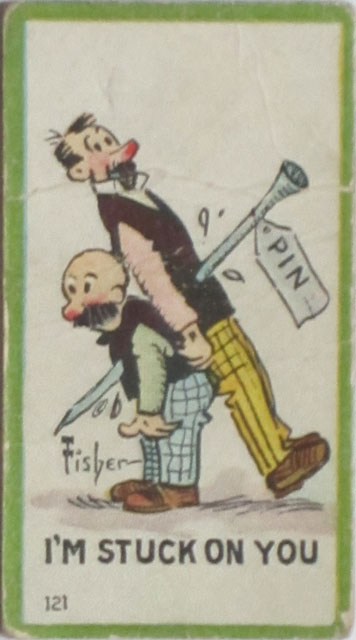
Any company, no matter how small, can develop unique brands and build their own brand related search stream, and associated searches, over time.
If you run a small company, do you occupy clear space? By clear space, think focused, unique selling proposition. What is the thing you offer that others do not? If other people offer what you do, then what is the thing you do better? How do people describe you? Can they reduce it to an elevator pitch? Is what you offer focused, or confused?
It?s about more than providing something a bit unique. In a cluttered environment, like the web, it's about creating something genuinely different. Probably radically different, given the high level of noise in the search results.
Once you have your differentiation down you can then advertise it, which creates further brand awareness: "High dwell campaigns are three times more efficient at stimulating branded search."
This makes for a more defensible search marketing strategy, because it's difficult for generic competition to emulate you once you've carved out a clear identity. It?s not about offering more features. Or a lower price. Those things are details. It?s about crafting a unique identity that others will know you by. Focus on the parts of your business that really make the money, and considering orienting your entire identity around that one aspect.
The problem with not having a clear identity and point of difference, when it comes to SEO, is that it is a constant battle to maintain position. Google can easily flush all the me-too sites that chase generic keywords and Google?s users aren?t going to complain. The sites with unique identities don?t have to spend near as much time, energy and money maintaining rank.
But hang on, doesn?t this go against everything SEO is about?
There?s nothing wrong with chasing generic terms. It?s a completely valid strategy. However, if we?re in it for the long haul, we should also make an effort to develop a clear, differentiated brand. It means we can own our space in the search results, no matter how Google changes in future.
Look at Trip Advisor. Google may be gunning for the travel space with their own content acquisitions, but they?re going to look deficient if they don?t display TripAdvisor. They are going to look deficient if they don't show Trip Advisor when people are looking for just about any travel review queries, whether Trip Advisor is targeting them or not, because Trip Advisor are synonymous with travel reviews. By not featuring Trip Advisor, Google would merely encourage more people to by-pass Google and search Trip Advisor directly.
That's a powerful place to be.
Not everyone can dominate the travel space like Trip Advisor, of course. But it is worth noting that Trip Advisor started small & the principle is the same, no matter what the niche. It?s about becoming the most memorable site in your niche. No matter if it?s poggo sticks for one legged dogs, then be the go-to site for poggo sticks for one legged dogs. Eventually, word gets around, and such a site become synonymous with poggo sticks for one legged dogs, and associated terms, whether they optimize for related terms, or not.
Google will associate keywords with this site in order to deliver a relevant result, and if this site owns the ?poggo sticks for one legged dogs? niche, then their SEO workload is greatly reduced.

Your brand should be something people will talk about. Where are all the links coming from these days? Social networks. Google pays attention to social signals - tweets, Facebook, Google+ and other social links - because that is the way many links occur. They are markers of attention, and Google will always look for markers of attention.
And as their audiences click through to you, Google gets valuable signals about your relevance to entire groups of people. You can be sure Google is grouping these people by interest - creating demographic profiles - and if your site interests a certain group, then this will flow through into searches made by these groups. Google can also tie many of these users back to their identities by using persistent cookies & Google+.
That's the way it's going. SEO, and wider marketing and brand strategy, will all meld together.
Source: https://adwords.google.com/select/KeywordSandbox
use seo seo tools seo tool land seo leaders online traffic mystic
Source: http://www.webconfs.com/website-keyword-suggestions.php
Source: http://www.elixirsystems.com/tools/linkpopularity.php
Source: http://www.webmaster-toolkit.com/link-popularity-checker.shtml

Working nine to five can suck.
You might be working for a boss who is an idiot. You know he makes stupid decisions. When he's off making yet another stupid decision, it's you left doing all the work. As for job security - that's a joke these days. He can fire you on a whim.
So why not cut out the weak link? Why not go into business for yourself?
The reality, of course, is that starting a business isn't as easy as saying it. You'll likely work longer hours, for less money, and there are no guarantees. While your friends are looking forward to the weekend, you might not see a weekend for a while. Most small businesses fail in their first five years, taking dreams and savings along with them.
Everything has a downside.
However, many businesses not only survive, they prosper. They make their founders wealthy. Even if they don't make fortunes, they can provide lifestyle benefits that are near impossible to achieve with a regular job. There's a lot to be said for being the master of your own destiny.
To achieve that, it's best to start with some good advice.
I've been running my own small business for a decade now. Whilst it's been rewarding, and I achieved the goals I set for myself, there has also been a fair few missed opportunities and inevitable wrong turns. I jumped in blind, and like many in the search marketing industry, pretty much made it up as I went along.
Not that there's anything wrong with that.
But I wished I had understood a few fundamental truths first. I wished someone had imparted some profound wisdom, and I wished I had been smart enough to listen. Come to think of it - they did, and I wasn't.
Such is life.
I?m in the process of setting new goals for the next few years. I'm restructuring. So I decided to reflect on the past, examine the good and the bad, and try to do more of the former, and less of the latter.
One of the problems I identified was that I was spreading myself way too thin over many projects. I have a *lot* of sites. I have domains I?d even forgotten I owned. I have domain names I keep renewing, vowing to do something with one day, yet never getting around to it.
In short, I was growing an awful lot of small pumpkins.
I?ve decided to ditch almost all of what I have been doing in the past, and focus on a very narrow range of activities, one of which is working with Aaron on SEOBook.
One book I really wish I'd read when I was starting out - had it been available, which it wasn?t - is called "The Pumpkin Plan: A Simple Strategy To Grow A Remarkable Business". I'd like to share the central theme of the book with you, because I think it's a great lesson if you're thinking of starting a business, or, like me, optimizing an existing one.
It?s the lesson I wished I?d understood when I started. I certainly hope it?s of help to someone else :)
There are geek farmers who obsess about growing huge pumpkins. They are the hackers of the vegetable world. In order to grow a huge pumpkin - weighing half a ton or more - you can?t just throw seeds on the ground. You can?t grow a whole lot of pumpkins and hope one of them turns out to be huge.
You?ve got to follow a process.
And here it is:
What?s this got to do with business? It?s a process for growing not just pumpkins, but businesses. Let's apply it:
In essence, it?s about focusing on those things you do best. It?s about focusing on your very best customers, and ditching the rest. It?s about creating your own niche by identifying and solving the problems that no one else does.
None of this is new, of course. There are plenty of business advice books that say similar things. However, this is one of those great little stories I wish I had internalized earlier. Rather than grow a lot of small pumpkins, focus on growing those that matter.
Given recent changes at Google, I dare say a lot of SEOs - particularly those who run their own small sites - may be rethinking their approach. Unfortunately, the small guy is being squeezed and the rewards, like in most endevours, are increasingly flowing to large operations. Search conferences, which used to be the domain of the lone-wolf affiliate guy and mom and pop businesses are now jammed full of corporates and their staff. The entire landscape is shifting. New approaches are required, not just in terms of tactics, but in the underlying fundamentals.
It would be interesting to hear your lessons in business. What are the things you know now that you wished someone had told you when you started? Please share them in the comments.
Source: http://www.seobook.com/business-lessons
link building use seo seo tools seo tool land seo leaders online
Last month we soft launched SEOTools.net. Here are a few entries as a sample of things to come...
... do subscribe to the RSS feed if you like what you see thusfar.
Good question, glad you asked. ;)
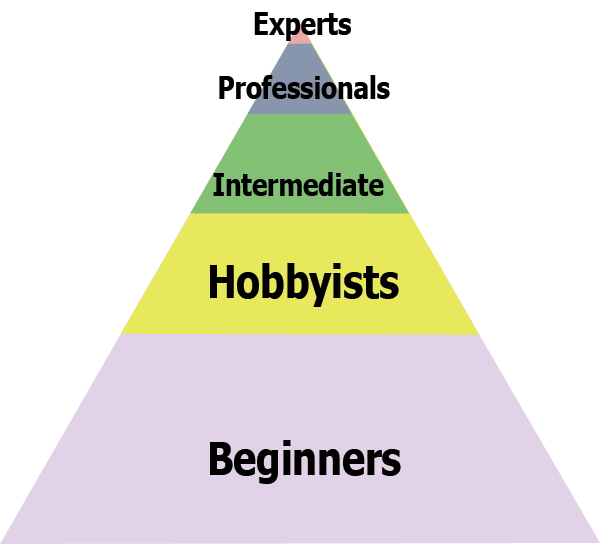
Our customer base on this site consists primarily of the top of this pyramid. I can say without doubt that I know that some of our customers know more about SEO than I do & that generally makes them bleeding edge. ;)
And then some people specialize in local or video or ecommerce or other such verticals where there are bits of knowledge one can only gain via first hand experience (eg: importing from China or doing loads of testing of YouTube variables or testing various upsells). There is becoming so much to know that nobody can really know everything, so the goal of our site here is to sorta bring together a lot of the best folks.
Some people newer to the field & a bit lower down on the pyramid are lucky/smart enough to join our community too & those who do so and participate likely save anywhere from 1 to 3 years on their learning curve...leveling up quickly in the game/sport of SEO. But by and large our customers are mostly the expert end of the market.
We could try to water down the community & site to try to make it more mass market, but I think that would take the site's leading strength and flush it down the toilet. In the short run it would mean growth, but it would also make the community less enjoyable ... and this site is as much a labor of love as it is a business. I think I would burn myself out & no longer love it if the site became noisy & every third post was about the keyword density of meta tags.
When SEOBook.com was originally created SEO was much less complex & back in 2003 I was still new to the field, so I was writing at a level that was largely aligned with the bulk of the market. However, over the past decade SEO has become much more complex & many of our posts tend to be at a pretty high level, pondering long-term implications of various changes.
When there are big changes in the industry we are usually early in discussing them. We were writing about exact match domains back in 2006 and when Google's algorithm hinted at a future of strong brand preference we mentioned that back in 2009. With that being said, many people are not nimble enough to take advantage of some of the shifts & many people still need solid foundational SEO 101 in place before the exceptions & more advanced topics make sense.
The following images either make sense almost instantly, or they look like they are in Greek...depending on one's experience in the field of SEO.
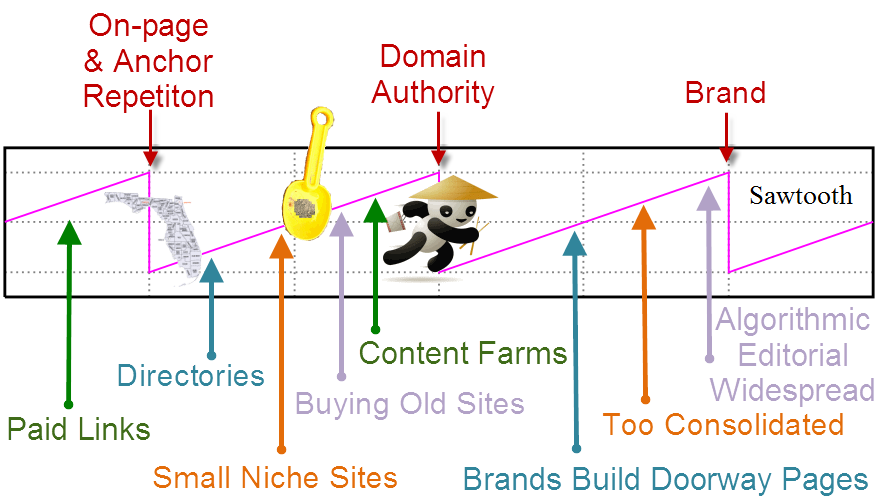
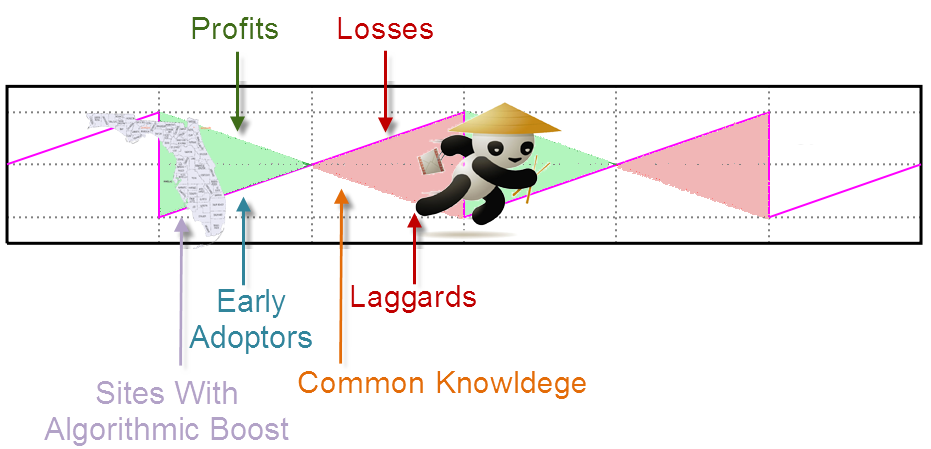
My mom and I chat frequently, but she tells me some of the posts here tend to be pretty deep / complex / hard to understand. Some of them take 20 hours to write & likely read like college dissertations. They are valuable for those who live & breathe SEO, but are maybe not a great fit for those who casually operate in the market.
My guess is my mom is a pretty good reflection of most of the market in understanding page titles, keywords, and so on...but maybe not knowing a lot about anchor text filters, link velocity, extrapolating where algorithm updates might create future problems & how Google might then respond to those, etc. And most people who only incidentally touch the SEO market don't need to get a PhD in the topic in order to reach the point of diminishing returns.
SEO has many pieces that are knowable (rank, traffic, rate of change, etc.), but over time Google has pulled back more and more data. As Google gets greedier with their data, that makes SEO harder & increases the value of some 3rd party tools that provide competitive intelligence information.
These data sets help offer clues to drive strategy to try to recover from penalties, & how to mimic top performing sites to make a site less likely to get penalized.
Our goal with SEO Book is to...
Our goal with SEO tools is to...
Source: http://www.seobook.com/seotools
seo tool land seo leaders online traffic mystic good backlink see book
Source: http://www.prsearch.net/index.php
seo tool land seo leaders online traffic mystic good backlink see book
Source: http://www.webuildpages.com/tools/internet-marketing-google.htm
Source: http://toolbar.msn.com/
use seo seo tools seo tool land seo leaders online traffic mystic
Source: http://www.webconfs.com/url-rewriting-tool.php
link building use seo seo tools seo tool land seo leaders online
Source: http://www.webmasterbrain.com/get-multiple-pagerank-values-without-google-toolbar--tool12.htm
link building use seo seo tools seo tool land seo leaders online
Source: http://www.webconfs.com/website-keyword-suggestions.php
Source: http://www.seochat.com/seo-tools/keyword-suggestions-google/
link building use seo seo tools seo tool land seo leaders online
Source: http://www.elixirsystems.com/tools/linkpopularity.php
Source: http://del.icio.us
Google timed a nice Friday evening release to update of their policy toward copyright infringement.
Starting next week, we will begin taking into account a new signal in our rankings: the number of valid copyright removal notices we receive for any given site. Sites with high numbers of removal notices may appear lower in our results.
Wow. Sounds like trouble. Surely that means that YouTube's rankings are about to get torched.
Oh, nope. One quick exemption for the video king:
This data presents information specified in requests we received from copyright owners through our web form to remove search results that link to allegedly infringing content. It is a partial historical record that includes more than 95% of the volume of copyright removal requests that we have received for Search since July 2011. It does not include:
- requests submitted by means other than our web form, such as fax or written letter
- requests for products other than Google Search (e.g, requests directed at YouTube or Blogger)
- requests sent to Google Search for content appearing in other Google products (e.g., requests for Search, but specifying YouTube or Blogger URLs).
Google does not state where the thresholds will be set & grants blanket immunity for themselves, yet they (illegitimately) emphasize that they are being transparent.
Only copyright holders know if something is authorized, and only courts can decide if a copyright has been infringed; Google cannot determine whether a particular webpage does or does not violate copyright law. So while this new signal will influence the ranking of some search results, we won?t be removing any pages from search results unless we receive a valid copyright removal notice from the rights owner. And we?ll continue to provide "counter-notice" tools so that those who believe their content has been wrongly removed can get it reinstated. We?ll also continue to be transparent about copyright removals.

Courts have ruled that embedding a YouTube video is not copyright infringement. The EFF has mentioned that embedding a video is simply a link.
And yet, a UK student faces up to 10 years in jail in the US for founding a crowdsourced site which links to sites that allow you to watch TV online.
Kim DotCom suffered a militant raid on his house & had his assets frozen for running MegaUpload, which was a tiny spec of dirt compared to the size of YouTube.
On the copyright front YouTube was rotten from the start:
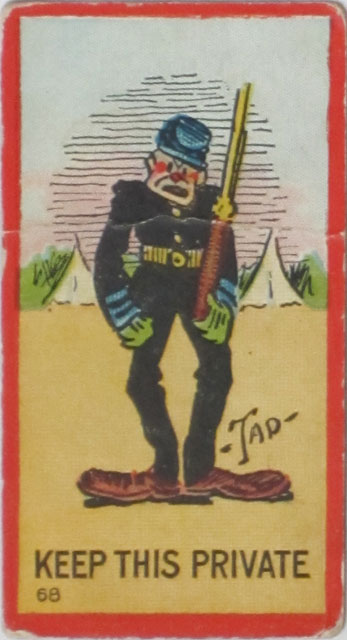
There still are a lot of murky questions in Google's "transparency."
Has anyone registered DMCASEO.com & DMCA-SEO.com yet? ;)
In terms of impact on the web for publishers, this change is every bit as big as Florida, Panda & Penguin. It may not seem so at first (as it will take time for market participants to consider the uses) but this is a huge deal. Consider some of the following scenarios...
Why did Google feel the need to grant themselves blanket immunity from the policy?
That question was largely missing among the fanboi blogs & journalists who were encouraged by Google's "transparency."
If YouTube is going to win big, then that's a great place to invest, right?
Maybe not.
Some venture capitalists are investing in YouTube channels, but that is a fool's game.
Note that I don't claim YouTube is a bad host for your own content, but that I am skeptical in applying the VC model to it with a belief that you can out-invest Google on their own site; particularly when they own the dominant platform, control the non-public revenue share rates, invest in competing channels & can offer free promotion + higher rates to anyone they invest into in order to dominate the category.
And the issue isn't just video either. The same dynamic can apply to just about any other infrastructural layer. For instance, Google could buy out a torrent site (say like uTorrent) and have that site gain immediately immunity for being part of the borg, while other sites that compete now absorb both greater editorial filtering costs & greater risks that destroy their ROI.
As Google continues to lock down search, you can expect more smart publishers to hedge investments in search and YouTube with investments in proprietary non-search applications that Google can't take away.

"We are optimistic that Google?s actions will help steer consumers to the myriad legitimate ways for them to access movies and TV shows online, and away from the rogue cyberlockers, peer-to-peer sites, and other outlaw enterprises that steal the hard work of creators across the globe. We will be watching this development closely ? the devil is always in the details ? and look forward to Google taking further steps to ensure that its services favor legitimate businesses and creators, not thieves." - Michael O?Leary, Senior Executive Vice President for Global Policy and External Affairs of the Motion Picture Association of America, Inc.
The concerned with Google pitching themselves as the preeminent authority on copyright is they have consistently played both sides of the fence.
When Google was competing against YouTube, this was how they viewed copyright internally.
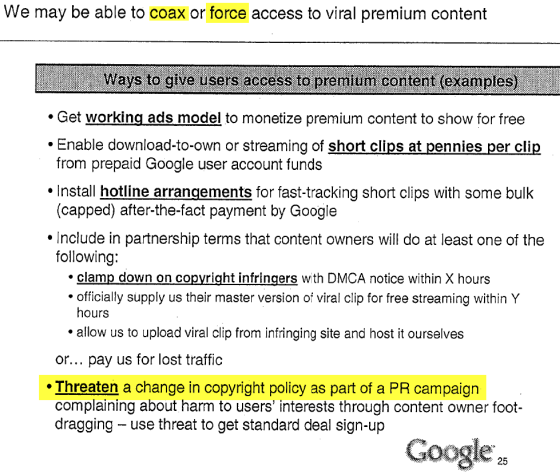

Google is a big player in business online and off. They can sell private data exclusively & their online profits are so huge that they are now buying auto loan bonds.
Now that Google wants to sell premium content they (sort of) respect copyright (& are willing to hold the rest of the web to a higher standard than themselves to create this impression).
I have long believed that relevancy signals were often politically driven & that internal business development goals often lead or create various signals. Certainly that was obvious when Google+ was hardcoded in the search results. It was equally true when Knol outranked the original content sources. Google frequently pretends to be (belligerently) unaware of externalities, but when the issues impact their own business they gain an elevated sense of importance.
And these business objectives not only influence the relevancy algorithms, but also the editorial guidelines.
And even while Google is rolling out this "copyright violators are spammers" algorithm (which they are exempt from) they still chug on with their ebook offering:
They posted several of my 41 books up as free downloads (some were missing a few pages at most a single chapter) It took several e-mails from me pointing out that they were infringing copyright before they took them down. During the time my books were free on Google my sales of e-books fell dramatically. " - K C Watkins
When Google started scanning books an internal document stated: ?[we want web searchers interested in book content to come to Google not Amazon? ... or, as put another way, in that same document, ?[e]verything else is secondary ? but make money.?
Source: http://www.seobook.com/copyright-spam
seo leaders online traffic mystic good backlink see book link building